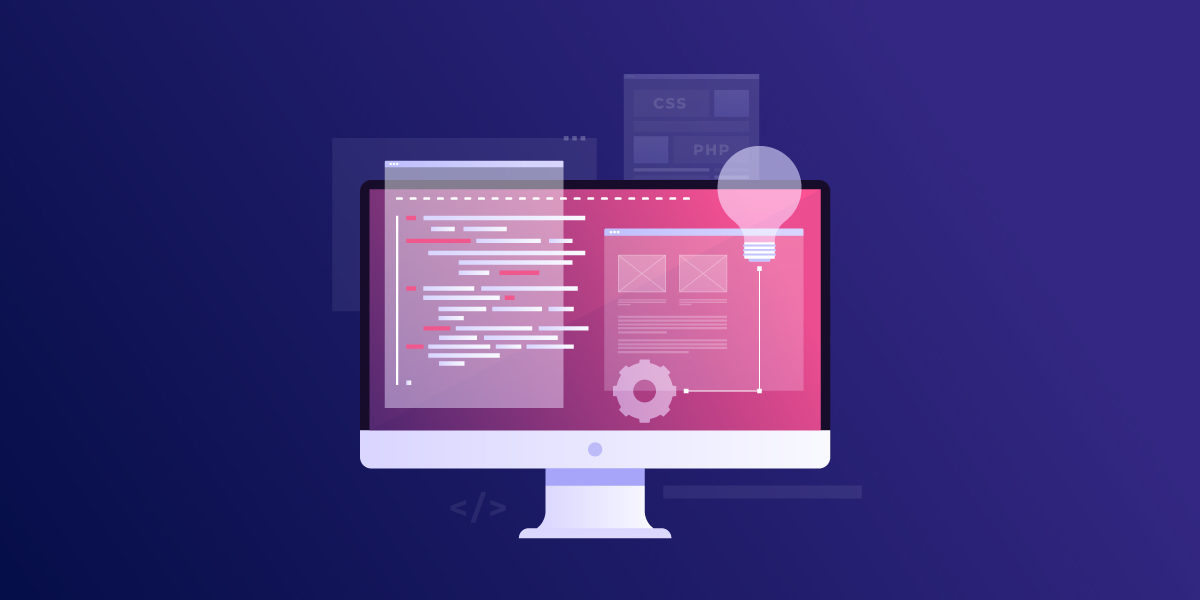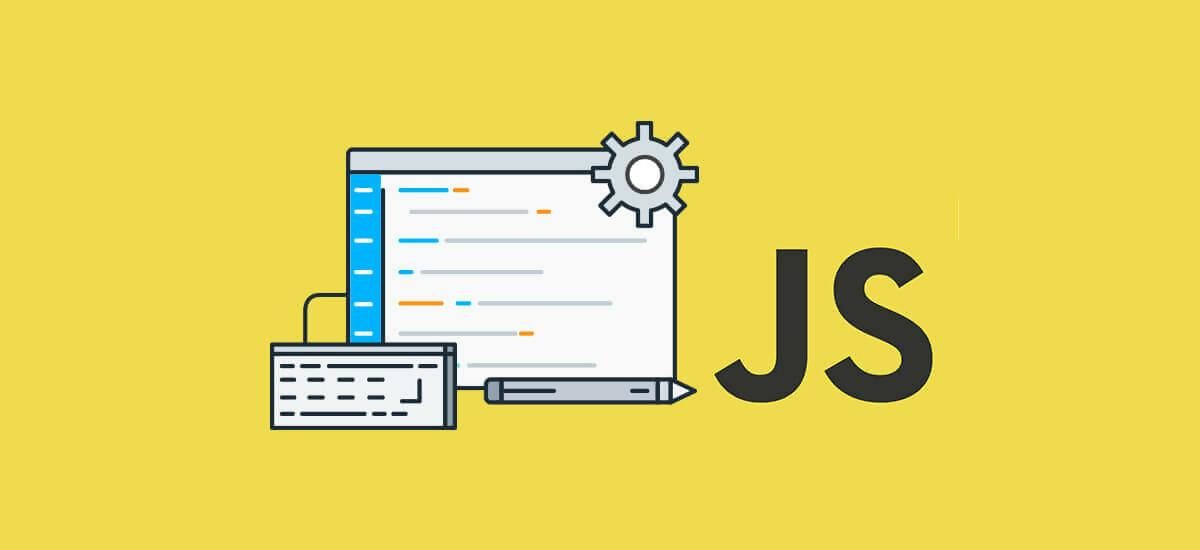Kotlin vs Java — which is better? Well, this battle commenced with the release of Kotlin in 2011. Even then, the powerful Java was completely busy in giving a tough time to all its new competitors. JetBrains developed this language with the aim to fill all the gaps left unfilled by Java. Kotlin got traction among developers, especially newbies, in the past few years. The announcement from Google saying it supported Kotlin as the standard language for Android applications led to a huge Kotlin usage spike among developers.
Now, the concern is: can a new language replace the good old Java? In this article, we will make a comprehensive Kotlin vs Java comparison, discussing their advantages, differences, performance, and future to help you better grasp who is winning in this big battle.
What is Kotlin?
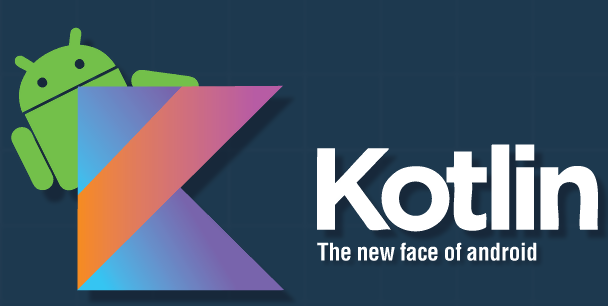
Kotlin is an modern, open-source programming language developed by JetBrains, a software development company behind software development tools like IntelliJ IDEA, PhpStorm, and other. At its core, Kotlin is a statically-typed language that combines the features of functional and object-oriented programming. Kotlin is fully compatible with Java Virtual Machine, and it was declared by Google as the official IDE for Android development. It is employed in the development of server-side and client-side web and Android apps.
What is Java?
Java is a powerful high-level programming language which is concurrent, object-oriented, and class-based. Released by Sun Microsystems in 1995, Java is a fast, reliable, and safe computing language, with which you can develop powerful applications for a single or distributed environment on the internet.
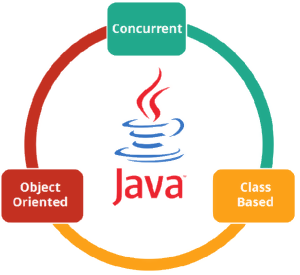
It is a platform-independent language, based on philosophy of WORA (Write Once, Run Anywhere), which allows for running the compiled Java code on any platform that supports Java. Used by approximately nine million developers, Java is one of the most famous programming languages in history, especially when it comes to server, web, and Android application development.
Kotlin vs Java: Features
Below are the features of Kotlin and Java that have played a vital role in making them popular:
Kotlin
- Open-source – Kotlin is an open-source programming language designed by JetBrains to work across platforms.
- Full Java Interoperability – Kotlin is fully interoperable with Java. It can run on Java Virtual Machine and supports all Java tools and libraries.
- Easy Maintenance – Not only Kotlin is easy to learn, but it also supports a lot of development tools that make the maintenance of code easy.
- Conciseness – Kotlin is more concise than Java as it solves the same problem with fewer lines of code. This enhances the code readability and makes the code more effective and efficient.
- Supportive Community – Although Kotlin is a fresh language, it has quite a supportive community where developers help each other in solving issues.
- Fail-fast System – Kotlin has a built-in fail-fast system that aids in avoiding errors and minimizing bugs in the code using its three standard library functions.
Java
- Object-Oriented – Java is an object-oriented programming language. It contains every OOP feature, including inheritance, polymorphism, abstraction, and encapsulation.
- Platform-Independent – Java code is compiled into a platform-independent bytecode that can be executed on any platform to which JVM is ported.
- Robust – Java is a strong language that uses memory management, an automatic garbage collector, and exception-handling to eliminate error-prone codes.
- High Performance – Java enables high performance due to its bytecode that is highly optimized by the Just-In-Time compiler.
- Secure – Java has built-in security features which include run-time and compile-time static type-checking.
- Multi-threading – Java supports multi-threading that allows for handling multiple threads simultaneously.
Advantages of Kotlin vs Java
Here are some major advantages of Kotlin and Java:
Kotlin
- Seamless Integration with Android Studio – Kotlin offers Integration with Android Studio that makes it easy for developers to create new projects with Kotlin files.
- Mature Language – Before the final release, Kotlin has gone through multiple stages. So, it has no problems in functioning and works smoothly with the IDE plugin.
- Safety – Kotlin’s simple and easy-to-understand code prevents a wide variety of common mistakes.
- Easy Android Development – When talking about Kotlin vs Java Android development, Kotlin makes it easier, as it has concise code and enhanced productivity.
Java
- Rich APIs – Java provides powerful APIs for different operations, including DB connection, I/O, networking, utilities, and other.
- Allocation – Java has a Stack Allocation System that makes data storage and retrieval easy.
- Distributed – Java makes distributed computing easy with its integrated networking feature.
- Power Development Tools – Java provides powerful development tools such as NetBeans and Eclipse SDK, which comes with debugging capabilities.
Kotlin vs Java: Differences
In general, Kotlin is similar to Java in many scenarios. However, if we make head-to-head comparison of Kotlin vs. Java, the differences become more noticeable:
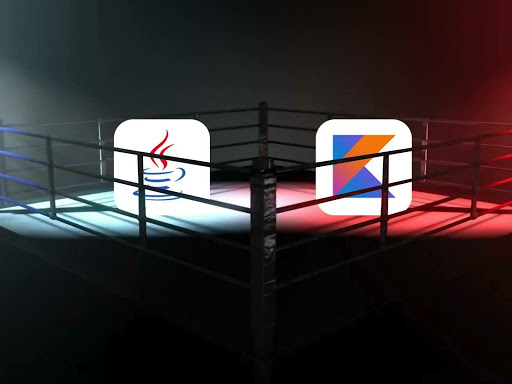
Kotlin vs Java: Comparison
Below is the table with Kotlin vs. Java comparison:
| Kotlin | Java | |
| Null Safety | By default, all types of variables are non-nullable (i.e. null values cannot be assigned to variables/objects). If a developer tries to assign or return a null value, the Kotlin code will fail at compile time. However, there is a special syntax that can be used to assign null values to variables. | The most frustrating issue that Java developers face is the NullPointerExceptions. Developers can assign null values to variables but when they try to access the object that points to the null value, there comes the exception. |
| Extension Functions | Developers can extend the functionality of a class using extension functions. These functions can be created by prefixing the class name that needs to get extended to the name of the function being created. | To extend a class with new functionality in Java, developers need to create a new class and inherit it from the parent class. Java lacks extension functions. |
| Co-routines Support | Long-running tasks can be run on multiple threads but Kotlin has co-routines support that suspends the execution at a certain point without blocking the thread and then resumes the operation later on some other thread. | Threads get blocked whenever long-running tasks are initiated in Java. Java uses the traditional method of creating a background thread to handle these operations. However, the management of multiple threads gets complicated. |
| Data Classes | Kotlin allows for creating classes for holding data in a simple way. Developers include the data keyword in the class definition and then the compiler takes care of every task. | In Java, developers need to write a lot of boilerplate code for classes to hold data. Typically, they need to define constructors, fields, getter and setter methods, equals(), hashCode(), and toString() functions. |
| Checked Exceptions | Kotlin has no checked exceptions. So, there is no need to catch or declare any exception. | Java has checked exceptions support with which developers can catch or declare exceptions. |
| Smart Casts | The smart casts feature of Kotlin handles the casting checks with ‘is’ operator that performs implicit casting. | Java requires developers to check the type of variable and cast as per the operation. |
| Type Inference | Kotlin takes type inference to another level. There is no need to specify the type of the variable as the compiler will guess its type on its own. | Java requires developers to specify the type of every variable explicitly during declaration. |
| Functional Programming | Kotlin supports object-oriented and functional programming. It consists of various useful functions like a wide array of higher-order functions, lambdas, inline functions, lazy evaluation, etc. | Java doesn’t support functional programming but it supports the subset of Java 8 specifications during Android apps development. |
Kotlin vs Java: Usage
Kotlin
A modern programming language, Kotlin was only used by professionals on its initial stage. Still, since Google made the announcement, Kotlin usage exploded, especially in students. Apart from being used for Android development, Kotlin is also used in web development, front-end and back-end.
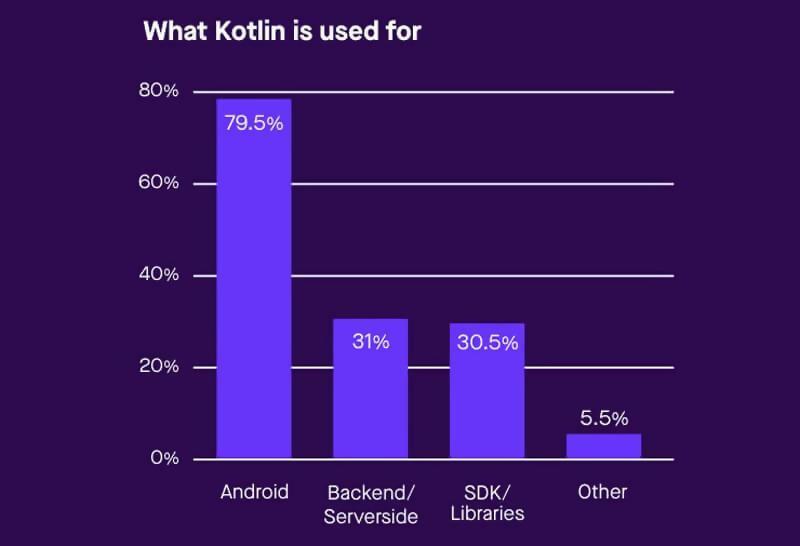
Java
Java is the most extensively used programming language that is currently running on three billion devices. It is used to build commercial websites, mobile, desktop, enterprise, and scientific applications, games, application servers, big data solutions, and software tools.
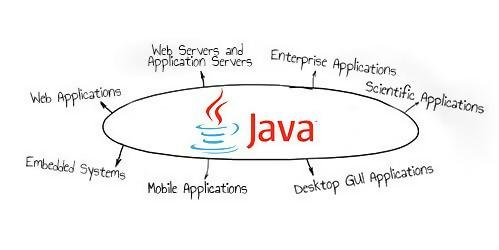
Kotlin vs Java: Which One Is Easy to Learn?
There are different factors that attribute to the learning curve of a programming language. When it comes to syntax, Kotlin is more demonstrative than Java. Kotlin provides several methods to generate a cleaner code, which makes it more readable and understandable.
However, learning a programming language is not just about the syntax. Finding a helping hand when issues arise, that is having an established community, is important. As Java has been around for decades, it has a larger community of developers, online code libraries, and references that are particularly helpful in case any support is needed. Still, it is worth remembering that Kotlin is relatively new, so it is evident that Kotlin will stay behind Java.
On top of that, although Java is quite similar to Kotlin, programmers should learn Java to start grasping Kotlin, as the latter comes from the first. Kotlin is easy to learn only if a programmer is already familiar with Java.
Kotlin vs Java: Which One Uses Less Energy?
Only Android developers can explain how tiring it becomes when they have to write lengthy code using Java. Java is an old programming, language and requires developers to spend hours writing the code, thereby increasing the chances of errors and bugs in it. Meanwhile, Kotlin is built to be more effective and less time and energy consuming for developers. As compared to Java, Kotlin uses 20% less code as it has various built-in features which remove the need to write boilerplate code on a regular basis. It enables developers to get more functionality with concise and compact code.
Kotlin vs Java: Example of Code
Below is the code example that shows the Java vs Kotlin difference in terms of number of lines required to perform the same task:
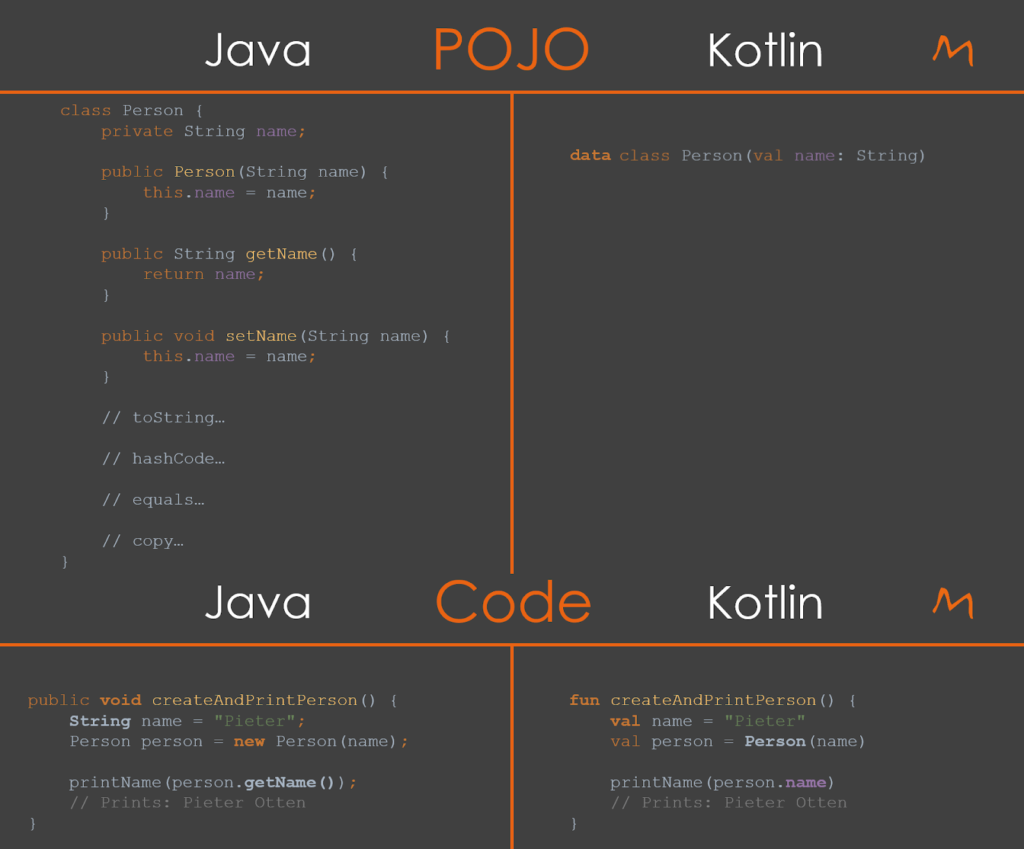
It is evident that Kotlin cuts the quantity of code lines by almost 40% compared to Java. After performing thorough research on Android Java vs Kotlin development, Java developers definitely move to Kotlin to enjoy this feature.
Kotlin vs Java: Performance
The performance of an application is highly dependent on various factors, like the nature of OS it is being built for, developer expertise, actual code, and so on. When comparing Kotlin performance vs Java, both of them are pretty much the same. Since they share similar bytecode structure, there is no measurable difference.
Still, when it comes to clean builds, Java compiles 10-15% faster than Kotlin. On the other hand, Kotlin offers some amazing built-in structures, like data classes that result in efficient and cleaner code. For consecutive incremental builds with single or no file, Kotlin can be even slightly faster than Java. However, we conclude that in this battle of Android Kotlin vs Java development, the efficiency depends on the performance of the specific JVM implementation.
Kotlin vs Java: Statistics
Since 2017, when Google declared Kotlin as an official language for Android development, many major companies switched their Java-based apps to Kotlin. As of March 2019, around 35000 applications are using Kotlin, with the overall market share of 4.8% across Google Play.
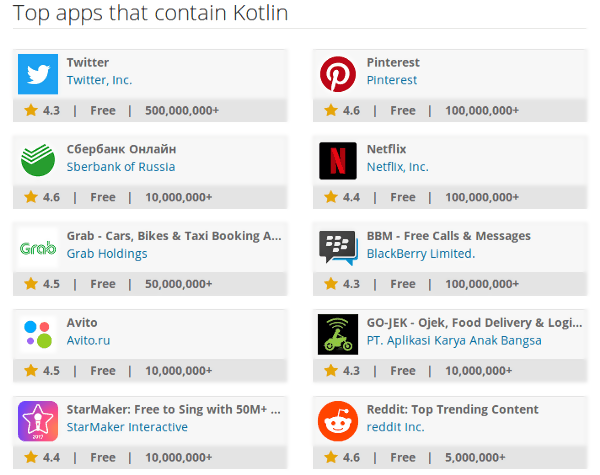
If we notice all the demerits of Java, Kotlin seems to be better in the Kotlin vs Java development battle. However, Java language enjoys success in other areas.
Kotlin vs Java: Future

Regardless of the unquestionable position of Java in the programming world, Android needed a modern language to support applications. Kotlin filled that place perfectly, being branded as a first-class language for Android apps by Google. Kotlin was developed to offer solutions to the problems Java did not come to resolve over the years. As Google itself has become Kotlin-oriented, this fact is causing developers to move towards adopting Kotlin. Be it as it may, Java will continue to be a famous programming language, while Kotlin is now the official language for Android that will be widely adopted by forward-thinking developers and businesses in the future.
Conclusion: Java vs Kotlin. Who is the winner?
Wrapping it up, anyone who wants to work with Android must have good knowledge of Java, especially if mastering Kotlin is a priority. Java is the basis of Android development efforts, so if you are a newcomer who wants to gain some experience in the programming world, get started with Java. If you are already a Java developer, learning and starting development with Kotlin, the language of the future, would be a great idea. Finally, it is all about choosing the language you are comfortable with, and the one that will fit your project work!
Kotlin vs Java — Further Reading
If you want to know what developers think and you want to dive deep on Java vs Kotlin, visit the websites of official developer communities of both programming languages.
Here is Kotlin, and here is Java.
Good luck with your development efforts!

